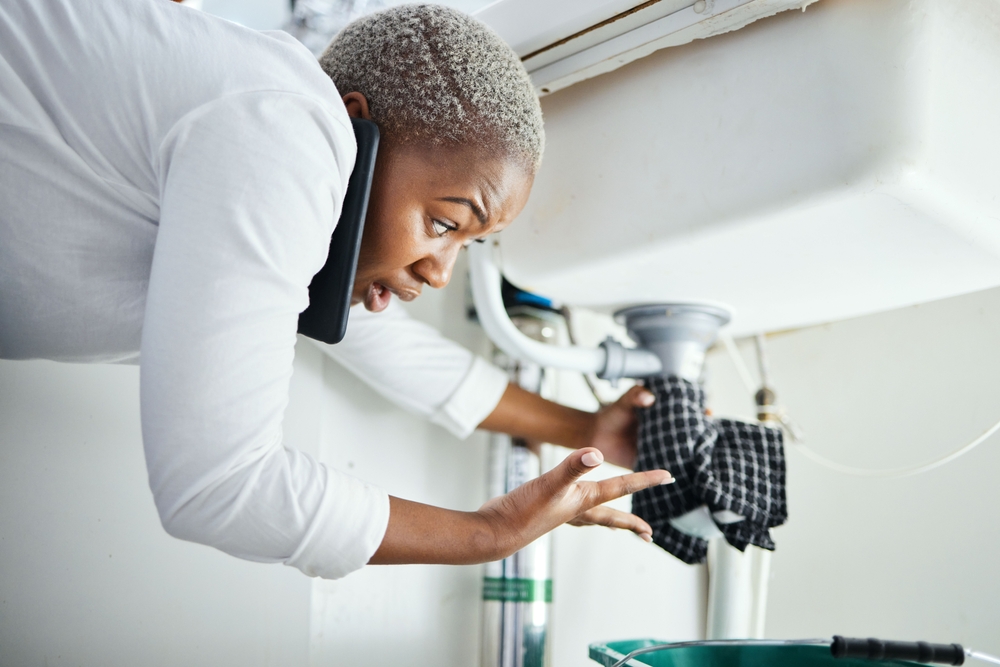We’ve all been there: a constantly dripping faucet or running toilet has given us a headache at one time or another. While the drip…drip…drip in the middle of the night or the phantom flush may seem like a mere nuisance you can put off until the weekend, they are often the first telltale signs of a water leak. And even small leaks like these can cause some of the most extensive damage to your home.
So, before you write off that little leak as “no big deal,” take a look at the risks to your home’s structure, your family’s health, and your own financial well-being.
The High Cost of a Small Leak
The real problem with a small plumbing leak is the amount of water you don’t see seeping into every nook and cranny of your home. As it saturates drywall, subfloors, and wooden support beams, it leads to a cascade of devastating problems.
Structural Damage
Over time, wood in your home’s frame, floors, and walls will absorb excess moisture from plumbing leaks, leading to rot and decay that can weaken its structural integrity. Even the drywall will become soft and eventually crumble, while your flooring can warp, buckle, or delaminate. In the end, instead of paying for a simple plumbing repair, you will have to invest in a full bathroom or kitchen renovation.
Mold and Mildew Growth
Where there is persistent moisture, mold is sure to follow. Mold spores are everywhere, just waiting for a damp, dark place to thrive. So, when even a small leak develops, it can create the perfect environment for mold and mildew. Once a colony takes hold, it will spread rapidly, releasing spores into the air you breathe and causing a host of health problems, including allergies, asthma attacks, and respiratory infections.
Increased Water Bills
It’s easy to underestimate how much water is lost through a small leak, but the reality is that that wasted water will show up on your monthly bill, eating into your budget unnecessarily. Over time, you could spend hundreds of dollars on water you didn’t even use.
An Open Invitation for Pests
Many household pests, including cockroaches, termites, and rodents, are attracted to moisture. A persistent leak creates a cozy place for these pests to live and breed. So, if you want to avoid a pest problem, fix plumbing issues as soon as possible.
Escalating Plumbing Issues
A leak rarely stays “small” forever. For example, a worn-out washer in a faucet may turn into a broken valve, and a tiny crack in a pipe can widen into a burst. The moral of the story is this: the longer a leak is left untreated, the more likely it is to turn into a plumbing emergency.
What to Do When You Suspect a Leak
If you hear a drip, notice a musty smell, or see a water stain appear on a ceiling or wall, it’s time to act. Follow these steps to potentially save yourself thousands of dollars in repairs:
- Confirm the Leak With Your Water Meter: Turn off all water-using appliances in your home and look at your water meter. If the dial is still moving, there’s a good chance water is leaking somewhere. If it’s not moving, take a photo of the meter reading, wait for two hours without using any water, and check it again. If the reading has changed, you have a slow leak somewhere in your system.
- Locate the Source (if Possible): Visually inspect the areas around sinks, toilets, tubs, and major appliances like your water heater and washing machine. Look for pooling water, drips, discoloration, or warped materials.
- Shut Off the Water: To prevent further damage, turn off the water supply. If the leak is coming from a faucet or toilet, you can likely turn off the water using the small shut-off valve on the pipe leading to that fixture. If you can’t find the source or the leak is significant, it’s best to shut off the main water supply to your entire house.
- Call a Professional Plumber: While it might be tempting to try a DIY fix, plumbing systems are complex. An improper repair can fail and lead to an even bigger flood. A licensed and experienced plumber has the tools and expertise to accurately locate the source of the leak and repair it correctly the first time.
Consider Installing a Smart Home Leak Detector
Technology makes it easier than ever to protect your home from plumbing disasters. Specifically, a smart home leak detector can alert you to potential leaks so you can take action immediately. Some models even automatically shut off your main water supply when a leak is detected to stop a potential disaster in its tracks.
Need Help with a Plumbing Leak? Call Beantown Home Services!
Are you dealing with a pesky plumbing leak? With Beantown Home Services ready to answer your call, you don’t have to worry about it adding stress to your day or damage to your home. Our team of expert plumbers in Plymouth, MA, has been diagnosing and repairing leaks of all sizes since 2005, and we’ll use state-of-the-art equipment and techniques to provide a lasting solution. Reach out today to schedule an appointment for a leak detection service!

